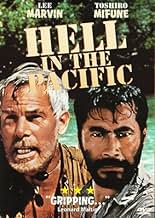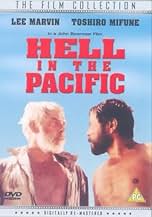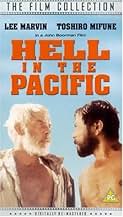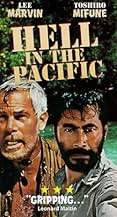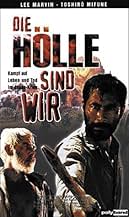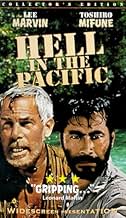Agrega una trama en tu idiomaDuring World War II, an American pilot and a marooned Japanese navy captain are deserted on a small uninhabited island in the Pacific Ocean. There, they must cease their hostility and cooper... Leer todoDuring World War II, an American pilot and a marooned Japanese navy captain are deserted on a small uninhabited island in the Pacific Ocean. There, they must cease their hostility and cooperate if they want to survive, but will they?During World War II, an American pilot and a marooned Japanese navy captain are deserted on a small uninhabited island in the Pacific Ocean. There, they must cease their hostility and cooperate if they want to survive, but will they?
- Dirección
- Guionistas
- Elenco
- Premios
- 1 premio ganado y 2 nominaciones en total
- Captain Tsuruhiko Kuroda
- (as Toshiro Mifune)
Opiniones destacadas
Boorman's third feature film, 'Hell in the Pacific' tells a relatively simple tale- arch-enemies forced to unite under circumstances beyond their control- in an astute and subtle manner. It is a quiet movie featuring characters given to introspection- often there is very little dialogue. A lot is said in that silence however, through the striking visuals, with the thick atmosphere, and by the presence and physicality of stars Lee Marvin and Toshiro Mifune. There are moments of levity, and it's a very suspenseful watch; but at its heart 'Hell in the Pacific' is a barbed treatise.
Through the understated story- written by Reuben Bercovitch, Alexander Jacobs, Eric Bercovici and Shinobu Hashimoto- a clear, humane message about the indignities and pointlessness of war emerges, and no side is given preferential treatment, no bias is injected into the screenplay. 'Hell in the Pacific' is a masterful war film- or anti-war film, one should say. For that is the crux of the narrative and the center of the allegory that 'Hell in the Pacific' is: war is hell, and there's no war when rivals unify; an aphorism bordering on the trite, but one that is apt nevertheless.
A highly visual experience, 'Hell in the Pacific' features fine, striking cinematography from Conrad Hall. Hall's work lends to the film something of a dream-like atmosphere, though is still firmly rooted in the naturalistic tradition. It is dramatic camera-work that lingers in the memory long after the film has ended. Boorman's films are always visually stimulating affairs, and 'Hell in the Pacific' ranks as one of his most rich, stylish and gritty.
Thomas Stanford's editing is sharp, establishing the film's pace, which is steady and smooth; though not overly brisk or without moments of sedation. Many critique the unexpected abruptness of the ending, but it is in keeping with the tone and themes the film tries to explore. Lalo Schifrin's muted, melodic score contributes to this tone, bringing to the film additional beauty, as well as additional devastation and impact.
'Hell in the Pacific'- for all of the merits listed above- could easily have faltered had casting gone in a different direction. Thankfully, Marvin and Mifune were secured, and deliver performances of incredible intensity, humor and depth. Marvin is too often remembered as an action star or a heavy, when in reality his talents extended far beyond that. He brought a charm and sense of purpose to every role he played, as well as an ease of performance that makes him mesmerizing on screen. His performance in 'Hell in the Pacific' is up there with his equally powerful one in 'Monte Walsh'; work of extreme emotional perspicuity that is most underrated.
Any film fan knows of the immeasurable talents of Toshiro Mifune. He could play any kind of character: drunkards, gangsters, fools- all with Shakespearean intensity. He also possessed masterful comedic timing, as well as being one of the most skillful expressionistic figures to ever grace the cinema screen. His performance in 'Hell in the Pacific' is understated, captivating and powerful; probably the best he ever gave in a production outside of Japan. He and Marvin share an electric chemistry that makes watching them on screen a real pleasure.
'Hell in the Pacific' is a masterful movie, a subtle story told with verve and intelligence. Deftly directed by John Boorman, beautiful in terms of visuals and featuring a fine Lalo Schifrin score, the film is utterly unforgettable. Lee Marvin and Toshiro Mifune deliver two brilliant performances that are highlights in both their careers. Hard-hitting and containing allegorical depth; there are few anti-war films as impactful. In short, 'Hell in the Pacific' is heaven in the cinema.
This is not Cast Away Meets WWII. For one thing, it has a much tighter focus, completely losing anything beyond the island's horizon. It is admirable in its bloody-minded focus, and, with only two actors to cast, it's hard to imagine how it could have been any more perfect that pitching wild-man extraordinaire Lee Marvin opposite Kurosawa favorite Toshiro Mifune. A genius idea, but one that could have failed with a more conventional approach.
We are introduced to both antagonists in a neutral way, free to prefer which ever one we choose, though that is hardly the point, and director John Boorman makes it both easy and at times hard to sympathise with either in equal measure. Both actors do a fine job, playing mostly emotional and physical roles with great restrain and intelligence.
Boorman's direction is perfect, rejecting excess stylization in favor of a subtle approach, aided by superb photography. You have got to see this at least once, simply because, for all its visceral thrills, it is quite profound without ever trying to be. Because it boasts top performances from two of the last century's greatest leading presences in action cinema. Because, though frustrating at first, the ending is, for once, the smartest one that could have been chosen. Humanity is on trial and the judges choose to be honest and pragmatic, thus delivering something that combines greatness and very thoughtful substance.
We need more films like this!
One outstanding feature of this film is that it is in both Japanese and English, intentionally without sub-titles. An American or Japanese audience could watch this film and appreciate its message. This duality serves to heighten the cultural differences between the two men, and it is cultural bias that is the true enemy.
Buy it, it's a keeper!
If you are one of the producers responsible for this theatrical release ending and are somehow still alive and reading this I can only ask WTF were you smoking? We invested two hours into the relationship between Marvin & Mifune for that??? It may be the worst ending I've ever witnessed in a decent movie. On the bright side for you, I may keep the blu ray for that reason alone!
¿Sabías que…?
- TriviaBoth Lee Marvin and Toshirô Mifune actually served in the Pacific during World War II, of course on opposing sides. Marvin was a US Marine. He was wounded during the war and received the Purple Heart during the Battle of Saipan in 1944. Mifune served in the Imperial Japanese Army Air Service.
- ErroresLee Marvin was 44 at the time of filming, as evident by his gray hair. Toshiro Mifune's character also calls him an "old man" several times. WWII US Navy pilots Thus, he looks much too old for an actual WWII US Navy pilot, who were mostly in their twenties or early thirties.
- Citas
American Pilot: Oh, for a second I thought you were a Jap.
- Versiones alternativasAmerican version featured an alternative ending where the two get drunk and walk off in separate directions arguing at each other; in the British version (which was exactly the same as the Japanese version), they start yelling and a bomb from the sky falls and blows everything apart.
- ConexionesFeatured in Hollywood Remembers Lee Marvin (2000)
Selecciones populares
- How long is Hell in the Pacific?Con tecnología de Alexa
Detalles
Taquilla
- Presupuesto
- USD 4,150,000 (estimado)
- Tiempo de ejecución1 hora 43 minutos
- Relación de aspecto
- 2.35 : 1
Contribuir a esta página



